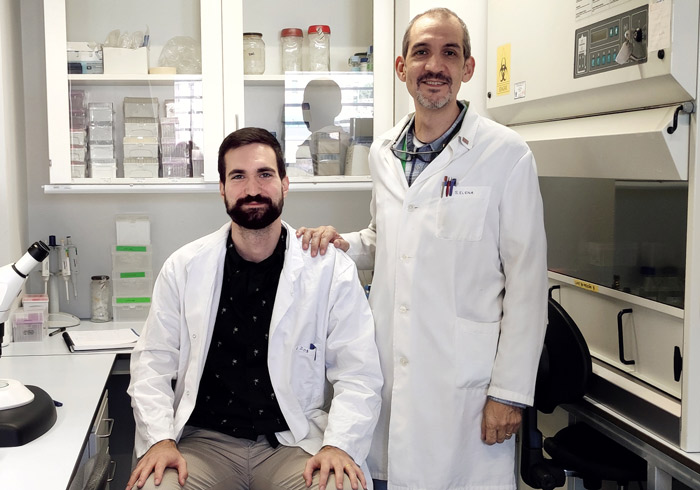Users
Social media
- More details here...
- Address
Parc Científic de la Universitat de València C/
Catedrático Agustín Escardino, 9
46980 Paterna (Valencia) Spain - Email:
iu.i2sysbio@uv.es - Phone:
(+34) 963544810
- Address
Links
Rubén González defends his thesis on experimental evolution of viruses in plants

Investigation & Education
Thesis
Rubén González defends his thesis on experimental evolution of viruses in plants

This doctoral thesis, directed by Santiago F. Elena, presents an experimental approach to the evolution of plant pathogenic viruses in various biotic and abiotic conditions that modulate said evolution. The results of this research have been published in the journals Genome Biology and Evolution, Virus Evolution, Advances in Virus Research and Proceedings of the National Academy of Sciences. The thesis was defended on November 9, 2021.
Experimental evolution allows us to verify theoretical postulates and make observations that increase our knowledge about evolution. This thesis aims to study the evolution of viruses using experimental approaches. Viruses show a high evolvability and are therefore good models for addressing evolutionary questions fairly quickly. The processes underlying the evolution and adaptation of pathogens are governed by many factors: from the intrinsic nature of the virus to environmental components that affect the host, the pathogen, and the interaction between the two. In this thesis, a pathosystem formed by a plant and a potyvirus is used to explore how different biotic and abiotic factors modulate virus evolution. First, the biological effects of mutations in a potyvirus protein, an essential component of the replication complex, were explored. The evolutionary limitations operating on this protein were revealed, a consequence of an evolutionary balance between accumulation within the host and the severity of symptoms. Second, the effects of host population genetic structure on virus evolution were examined: viruses were evolved in genetically homogeneous populations of plants with different susceptibilities to infection and in a heterogeneous population. This work illustrated how host genetic diversity in an ecosystem affects virus adaptation, as viruses specialized more rapidly in homogeneous populations but were more pathogenic in heterogeneous populations. Finally, the impact of the environment on the virus-plant interaction was studied. To do this, first the possible beneficial effects of virus infection in certain environments hostile to the plant were reviewed. Subsequently, the effect of drought was studied, an environmental condition with increasing incidence and which is known to affect host physiology. Thus, a virus evolved in hosts under conditions of drought or abundant irrigation. Drought-adapted viruses conferred increased drought tolerance to the host plant through specific alterations in host gene expression and hormonal signaling. In summary, this thesis contributes to greater knowledge of the evolutionary biology of plant RNA viruses.
Rubén González's thesis has been carried out in the Evolutionary Systems Virology research group of the I2SysBio under the direction of Santiago F. Elena (Research Professor at the CSIC). During the development of his thesis Rubén González has enjoyed a contract within the FPI Program (Ministry of Science and Innovation, FEDER) and a short-term EMBO and FISABIO scholarship during his stay in the laboratory of Prof. Marie-Anne Félix (Institut de Biologie de l'École Normale Supérieure, Paris). The qualifying panel was made up of Esteban Domingo (CBMSO, CSIC-UAM), Vicente Pallás (IBMCP, CSIC-UPV) and Anna-Liisa Laine (University of Zürich), who rated the thesis as outstanding.


